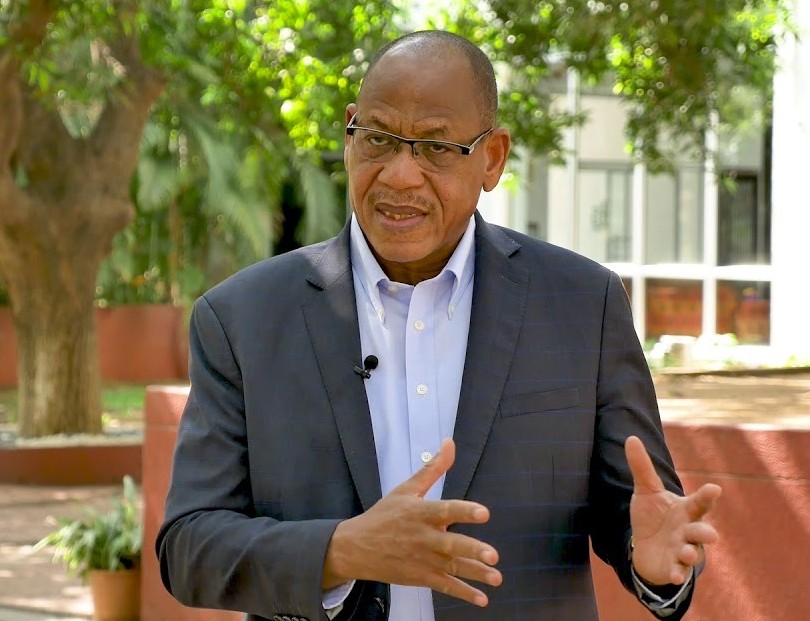INTERVIEW: With Technologies, Africa Can Feed Itself – Prof. Sereme Paco

Professor Paco Sereme is the Vice President (West Africa), African Academy of Sciences and also the President, Academy of Sciences, Arts and Letters, Burkina Faso. He is a Plant Pathologist, in this interview with Juliana Agbo, he speaks on the need for Africans to adopt the use of biotechnology to boost food production for the growing population.
Does Africa need Biotechnology in the agricultural sector?
Biotechnology plays a pivotal role in the agricultural sector. We have been dealing with some crops for centuries, and those crops have their advantage like some resistance to some challenges like drought, but if you look at the productivity of those crops, they are low and biotechnology is allowing us to improve the productivity of those crops. The population of Africa is growing so fast, it is a big challenge because we cannot feed all these people if we are still dealing with the traditional way we are making crops in Africa. It is a big advantage for Africa to use biotechnology, if you look at the policy in some countries at the African Union (AU) level, it is clear that we need Biotechnology.
Can you tell us one reason why Africa should adopt biotechnology?
I will say the growth of the population is enough reason for us to adopt the use of biotechnology in Africa. The traditional way we are doing cropping, we cannot afford to feed the population, when I was young in this country (Burkina Faso), I remember our population was 3.5 million, now we are 22 million and the farmers are Still dealing with the same yield. Biotechnology has an advantage as it enables us to increase our yield in terms of quality and quantity.
At one point, Burkina Faso was a leader in the continent on biotechnology deployment, but today, it’s different, what went wrong?
There are many reasons because I think there was a lack of communication between policymakers, the scientists, and the stakeholders, for example when they realised that the fibre of BT cotton was short with the implication that the price decreased, the policymakers should have questioned the result. It is possible to ask how to improve the length of the fibre, then if so, what should we do? But this was missing. At the same time, the lobby against the use of genetically modified organisms (GMOs) was also very strong and made a lot of noise. Do you know today, some farmers are coming to the scientists asking who will bring us back to BT cotton? I think the reason why Burkina Faso is not producing BT cotton is not linked at all to what people are trying to say but due to a lack of proper communication.
PBR cowpea is about to be released, what are the lessons learnt from the BT cotton experience that will help guide the release?
One of the many reasons why the Bt cotton was stopped is the insufficient communication on the path of scientists working on it and the failure on the part of policymakers to ask the necessary questions. For this new crop, I think the most thing to do is to emphasize communication, because if the scientists explain why the use of pesticides is not efficient for the control of Maruca, no farmer will go on the field at night to say he wants to spray a chemical on his field, but if the scientist explains, going through some organised stakeholders, they will understand and make it easy for the adoption of this technology. I think the lesson drawn from BT cotton will be very useful and very soon, Burkina Faso will join Nigeria and Ghana for the release of BT cowpea.
As a scientist, why do you think it is important for Burkina Faso to adopt GMOs?
If you look at the region of West Africa, Burkina used to be the second largest producer of cowpea, but most of our production is going to Ghana, Togo, Nigeria, and the Benin Republic because those countries need a lot of this crop but they cannot produce too much so it is a big opportunity for us. If we can improve the productivity of the crop instead of having 300,000 tons per year, if we have 500,000 tons per year, that will be okay. It will contribute to food security and improve the condition of farmers in terms of having some cash products, the crop also contributes a lot to soil productivity.
You mentioned that Burkina Faso produces a lot of cowpeas, but most of them end up in Ghana, Togo, and Nigeria, do you think there is a need for the establishment of a regional Economic Community of West African States (ECOWAS) framework to harmonise this?
For the conventional crop, there is a regulation already at the Economic Community of West African States (ECOWAS) level. For example, if I am a seed producer and I have a crop that has been certified In the country, I can send it to Nigeria, and there won’t be a problem, that is the same approach for the promotion of biotechnology in this region, I have been the Executive Director for CORAF for 12 years and one of our big achievement is to bring all the ECOWAS countries to have a regulation on biosafety and biotechnology, the country is not the same level but CORAF is also helping them to be at the same level. If that happens, it will be very easy to use the modified seed in this region or from one country to another. So CORAF, which is a sub-regional Organization based in Senegal, is a kind of network of all agricultural research in West and Central Africa to improve the collaboration of scientists for the benefit of all the country.
What other crop do you think biotechnology can help Burkina Faso improve?
If we succeed with the BT cowpea, for me, other crops are coming. I have seen, for example, Philippine yellow rice with a lot of adventure that led to that in terms of quality, and nutrition. We claim that we want to be self-sufficient in rice, which has been there for many years, but we are far from reaching this objective and I think a crop like rice, if we properly use some technology to address some issues, of course with some insects and disease in the country that affects crops, we will want to improve the nutritional quality which biotechnology can help. But would be determined by the way we will succeed with the Bt cowpea.
Those who oppose this technology go to the US and eat these foods. When they come back, they tell their people not to eat, that it’s not good, what do you have to say?
That is why I said we have to improve communication, is like we give these people all the liberty to do what they do and we are just sitting in the corner, looking at them, we are not doing enough because up till today, nobody can show us the evidence that the use of those modified crops has some health issues and environmental issues, we have to be better organised for that. That is one of the key focuses of the National Academy. We have to convince the government of the need to use this technology to improve agriculture.
A lot of things have been happening that require scientific answers, don’t you think the African Academy has been too quiet on the continent?
A lot of things of things have been happening within the Academy. The Academy is undergoing a rebuilding process and I see a lot of people with enthusiasm, but now that is not the case, we have to regain the confidence of people. If you look at the funding of the academy, it’s just through Bill and Melinda Gates, the European Union, and some people in the UK. We have to improve that. The African Union is part of the governing council of the Academy, they should also play a key role on ways to encourage people to be more proactive and to give advice to the government to implement some policies. When COVID-19 happened, people in Europe produced their vaccines and used them before sending leftovers to us. We should also take a leaf from such issues.






